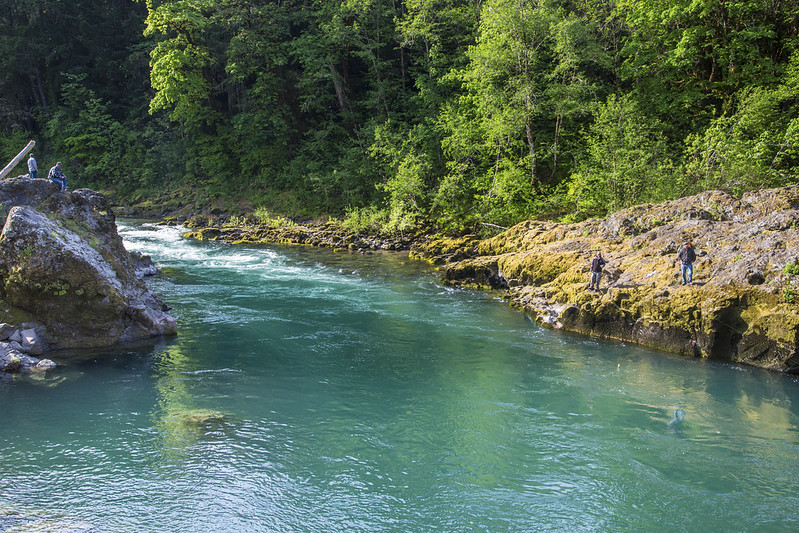
For 2nd Time In 3 Summers, North Umpqua Closed To All Fishing
All fishing on Oregon’s North Umpqua and its tribs will be shut down starting Monday, July 31, due to a low return of wild summer steelhead, as well as water temperatures approaching 80 degrees.

It’s bad news for fans of this famed summer fishery, but ODFW says biologists are predicting 2023’s run won’t meet the 1,200-fish critical abundance level, identified in the Coastal Multi-Species Conservation and Management Plan and which the agency defines as “the point where conserving the population could be in jeopardy if a downward trend continues.”
Wild summer-run counts at Winchester Dam on the lower river by Roseburg are reported to be just below 50 percent of “the amount needed to expect meeting critical abundance for the year.” Counts are done using video, which is livestreamed on YouTube, but updated monthly tallies weren’t immediately available.
The closure runs through November 30 and is in effect from the mouth to a marker below Soda Springs Dam. In August 2021, angling was shut down in these same waters for similar reasons.
ODFW says the primary factor in this year’s low run is ocean conditions, which will have some anglers scoffing for its catch-all nature, but steelhead have been found to be highly dependent on the top 20 feet of water in the Pacific and thus are heavily impacted by warming there and how that affects forage availability, and other factors.
“The inherited requirement to live at the ocean surface and the continued ocean warming that includes recent marine heat events, identify the urgent need to better understand the ocean ecology of steelhead, particularly in the winter,” three Canadian scientists wrote in a 2022 paper that came out of recent international surveys in the Gulf of Alaska.
ODFW also cites “very warm water” in the mainstem Umpqua and lower North Umpqua – steelhead become stressed in temps above 70 degrees – and speculates that predation by introduced smallmouth and striped bass “has potentially increased, likely contributing to lowered runs.”
State district fisheries biologist Greg Huchko says a variety of the system’s species are struggling versus other Oregon Coast watersheds, with coho and summer steelhead having the toughest go.
Last year, with Winchester steelhead counts a bit above ODFW’s critical level and the North Umpqua kept open for fishing, anglers harvested 62 hatchery fish in August, 61 in September, 75 in October and 44 in November above the dam.
These waters are also beloved by catch-and-release steelheaders, but an important local angling voice is supporting the closure.
“We support ODFW’s difficult, but necessary, action to protect the North Umpqua River’s legendary summer steelhead run by closing the summer steelhead fishing season this year due to dangerously low adult returns,” said Dean Finnerty, Trout Unlimited’s Oregon lead and Wild Steelheaders United director. “The fact that this last-resort action is needed for the second time in three years is a grim reminder that in this age of rapid changes to our landscapes and waters status quo fishery management won’t cut it.”
“Anglers need to up their game, too, and be better advocates for practices and policies that are proven to help wild steelhead,” Finnerty added. “We simply can’t accept continued loss of fishing opportunity on some of our last, best wild steelhead rivers. Wild Steelheaders United and Trout Unlimited will redouble our efforts to work with our tribal and conservation partners, the steelhead angling community, and with ODFW and other agencies that manage wild steelhead to do whatever is necessary to protect and recover the iconic native sport fish of the Pacific Northwest.”
According to Huchko, ODFW and its partners are working on riparian and in-stream habitat so as to benefit native fish populations.
In late summer 2020, the Archie Fire burned large portions of the middle North Umpqua, including much of the Rock Creek Hatchery.
